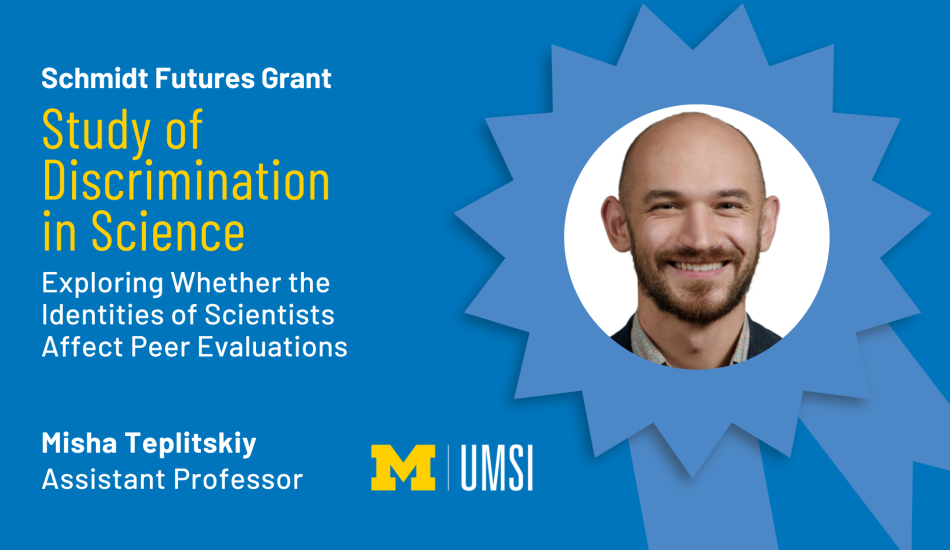
Misha Teplitskiy, assistant professor at the University of Michigan School of Information, was awarded a $115,655 grant from Schmidt Futures for his research project “Study of Discrimination in Science – Exploring Whether the Identities of Scientists Affect Peer Evaluations.” The award provides funding for one year.
Teplitskiy’s research has frequently focused on making sure science is equitable and reproducible. For this project, Teplitski will investigate how biases show up during peer reviews and how that might affect researchers.
“Peer review decisions often determine which projects get funded, which work gets attention, and just about everything else in science,” says Teplitskiy. “So if there is bias in reviews, that’s a huge problem for the entire scientific ecosystem.”
He says he and his colleagues want to understand “the extent of bias towards famous people. But an even bigger question is how to reduce the bias.”
Teplitskiy and his team have partnered with one of the world’s largest academic publishing companies, Institute of Physics Publishing (IOP), which gave the team data on the evaluation of approximately 180,000 manuscripts.
Recently, IOP changed their submission instructions to strongly encourage authors (what researchers call “nudging”) to anonymize their paper submissions. This practice hides authors’ identities and allows reviews to focus on the content of the research rather than the clout of the researchers.
“It’s very hard to unambiguously prove bias, but evidence is accumulating that when the names or institutions of high-status researchers are shown to reviewers, they tend to give better evaluations,” he says. “This setting is basically perfect for assessing nudging as a bias-reduction practice.”
Although the research has just begun, Teplitskiy says the team is already showing that nudging authors may have an effect on publications. “Our early analyses are showing that nudging results in low-status researchers (who have less accrued citations) are getting papers accepted more often, and middle- and high-status researchers are getting accepted less,” he says.
Teplitskiy says these are early results, but also very encouraging. “We hope that by showing that this simple nudge policy can achieve some of the bias-reduction of the much more expensive and difficult-to-implement policies, we can increase its adoption throughout science and ultimately decrease bias.”
Schmidt Futures is a philanthropic initiative, founded by Eric and Wendy Schmidt, that finds exceptional people and helps them do more for others together. Schmidt Futures supports and makes grants to for-profit and nonprofit organizations in order to support the most talented people and most promising ideas in technology, scientific breakthroughs, and paths to shared prosperity in society.
LEARN MORE:
Learn more about assistant professor Misha Teplitskiy.
Read Teplitskiy’s research “How status of research papers affects the way they are read and cited.”
Learn more about Schmidt Futures.


